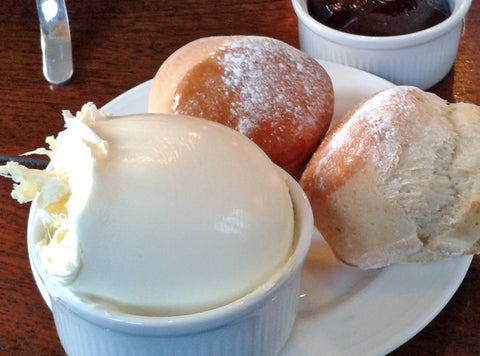Clearly, we love clotted cream here at Devon Heaven and our business relies heavily on its appeal so we thought we’d take the time to learn some more about this cherished West Country creation.

What makes Clotted Cream Clotted?
Wikipedia describes clotted cream as: a thick cream made by indirectly heating full-cream cow's milk using steam or a water bath and then leaving it in shallow pans to cool slowly. During this time, the cream content rises to the surface and forms "clots" or "clouts".
Cream has the same properties as milk but it is richer in fat. What sets clotted cream apart from other creams is that it has an even higher fat content.
Minimum fat content allowed in each type of cream:
Half cream - 12% fat
Single cream - 18% fat
Extra thick double cream - 48% fat
Clotted cream - 55% fat (55% is the minimum, typically its around 63%)
Clotted Cream Producers
Although the appeal of clotted cream has spread nationally, the production of clotted cream is still dominated by producers in the South West. Rodda’s of Cornwall are the biggest manufacturer making over 10 tonnes of it a day. They’re also one of the oldest producers with over 100 years’ experience. Langage Farm are the biggest producer in Devon, they were the first UK Carbon Neutral Dairy with an onsite Anaerobic Digester Facility that generates the farm’s electricity from food waste.
What makes the Best Clotted Cream Flavour?
The colour, consistency and taste of clotted cream are affected by the breed of cow, the type of food they eat, their pasture and the method of cream production. Cows are often indoors during the winter months and outside for the summer, butterfat levels are usually best in the middle of summer when the cows have settled into outdoor living. The higher the butterfat in the milk the richer and more coloured the clotted cream. Jersey and Guernsey breeds of cow are said to produce the highest buttermilk content.
Differences Between Cornish and Devonshire Clotted Cream
Both Devonshire and Cornish clotted cream is produced using the same or similar methods, the main difference comes from the cows pastures (the better the cows diet the better the clotted cream). The conditions required to produce the best pastures don’t exactly follow county boundaries however generally Devon has more varied, deeper soils ideal for dairy farming. On the other hand, Cornish dairy farmers benefit from slightly milder winters and more rainfall both of which can benefit the cows so it’s hard to say that one county is clearly better than the other for dairy farming.
Differences between farmhouse and commercial clotted cream
We’re used to assuming that local products produced on a small scale are better than mass produced products as this is often the case. Usually, this is due to better quality ingredients and less additives used with smaller scale production. However, with clotted cream the ingredient is simply milk with no additives or preservatives, regardless of the scale. The methods used for farmhouse and factory clotted cream follow the same process with the latter performed on a much bigger scale. Rodda’s commercial clotted cream is cooked in specially designed ovens that have a high degree of control with butterfat levels carefully checked along the way. This results in a very consistent product, whereas farmhouse clotted cream can be slightly more varied in flavour, colour and texture.
Judging Clotted Cream
Clotted cream should be judged on its colour, consistency, flavour and crust. It should be firm enough that it sits on the scone without spilling but without being too stiff. The crust is an essential part of clotted cream and it gives it it’s uniqueness over other cream so any good clotted cream should have a nice thick layer of crust. Colour is another consideration when judging clotted cream and contrary to popular opinion yellow (rather than pale white) indicates a higher quality cream as it results from a higher butterfat level.
See also: Devon and Cornish Cream Tea Debate
 Over 40,000 5 Star Reviews
Over 40,000 5 Star Reviews
5 comments
Roddas just has much better distribution than the Devon producers. We sell Devon clotted cream by post.
Why can’t I get Devon made clotted cream in the North West of England but I can very easily buy Roddas clotted cream being as I was born in Plymouth,I would prefer to buy a clotted cream made in Devon ,but can’t.
I’m not sure. The Devon county show used to do a clotted cream competition and Taste of the West do awards by category.
Hi there, is there a local clotted cream competition?
Fyi, i produce my own Jozie’s Homemade Clotted Cream & would like to enter a competition.
Thanks in advance for any help.
Does clotted cream us homogenised milk?